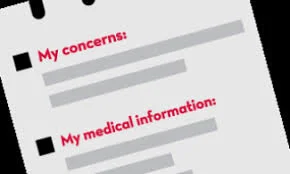MANAGING YOUR HEALTHCARE TEAM
It is helpful to think of your health care providers (including your doctor, consultants, and nurses) as if they were very well educated and experienced specialty contractors who are doing very specialized and fine repair work in your home. They are due massive levels of respect for the career decisions and commitments they have made to improve our lives, but they are also just people like the rest of us.
Take Control of Your Healthcare for Better Outcomes
Our Healthcare providers are business people, just business people who have a high calling. Like other business people, they are subject to the demands of their facilities, their partners, and their bosses. Medicine is a business that, like all other businesses it needs to cover its overhead and make a profit.
The medical care delivery system is under enormous economic pressure because of skyrocketing overhead costs and the continually shrinking reimbursement schedules they are forced to accept. Often their numbers don’t make economic sense.
This reality has caused a major crisis in the delivery of direct healthcare services, and much of the burden has been placed upon the shoulders of the individual provider. As their economic reality becomes more difficult, they are forced to provide care in a different way than their predecessors were able. They are pressured to see more patients in less time and perform more procedures creating a situation in which we patients get less from them for more money. Sometimes, the economic pressure translated to our having unnecessary procedures!
This situation is not the fault of our Healthcare providers; it is the current health care delivery system that is to blame. This situation will continue to become worse until society can come up with a better and more equitable healthcare delivery system.
If you watched television in the 1950s, you might remember Dr. Marcus Welby. Dr. Welby was a family practice physician who handled one case each show, was also a long time family friend with most of his patients, did everything himself and managed to sit down and spend endless time with every patient and their family. Besides being an extraordinary doctor, he was a family advisor and was the community wise man.
Unfortunately, there is bad news, Dr. Welby has retired and is no longer taking new patients. When he did practice medicine, he never had to worry about the healthcare economics faced by today's doctors.
Finding the best doctors is one of your first and most important tasks. You should go into the process understanding that, due to the realities of practicing medicine in today’s economic environment, our doctors will not always meet all of our expectations.
Given the current situation, we must step in and learn to manage our doctors so that we can still get what we need from them. To do this, we need to think about how we manage our relationships with our doctors, especially when we are meeting them in their office or the hospital.
Despite Dr. Welby’s retirement your doctors can and should still provide you with excellent guidance and suggestions, they should offer you complete lists of treatment options available along with all the possible results, both the positive and the negative, that could stem from every possibility offered. They should be able to explain to you potential treatment conflicts you could experience resulting from prior treatments you have had or are currently receiving. They should be honest with you in their appraisal of your condition and in their actual treatment success rate unique to all the options they offer.
All the information provided by them should always be highly specific and given to you in easy to understand language, without medical jargon. The provider should, periodically stop their explanations and confirm that you follow what they are telling you. They should be soliciting questions and feedback from you as they share their knowledge and experiences. If they don’t offer you an opportunity to ask questions, stop them and ask your question. Don’t wait; you might forget your question.
They should be prepared to spend a reasonable amount of time helping you understand anything that confuses you. If the providers are unable to explain it, so that you understand, they should connect you to a resource that can. It is very reasonable for a doctor not to have all the answers, but they do need to help you find the answers.
Sometimes it will become necessary for you to develop skills to manage your meetings with your doctors. If you are not getting what you need from them, including the items we have mentioned, you should always stand up and make your concerns known, tell them directly, but always do this in a reasonable and polite fashion. You must become your own personal advocate; if you don’t take on this role nobody will do it, and you will be left in the dark and not be able to make the best possible decisions.
Also, remember that the doctors do have to go on and see other patients, so you must also be reasonable and respectful in your time demands.
Doctors are often under a lot of time pressure from their institution or their supervisor to see too many patients each day. These expectations are often rigorous, seem to be increasing every day and are not designed to be sensitive to patient needs. As a result, you could find yourself in a situation where you are not finished asking your questions, and the doctor is already out of the door.
Doctors Might Try and Move On to the Next Patient Before You Are Finished
When facing this situation, you will need to take control of the meeting and make it very clear that you have additional questions or concerns that need to be discussed at this meeting, not one in the future. Usually, being politely assertive and very direct and specific about your needs will solve your problem, the doctor may be a little uncomfortable, but given the magnitude of cancer, your needs have to be your concern and the priority.
You do need to remain respectful of their time demands, but you also have the right to have your reasonable needs met. Make your needs known directly don’t just hint around. Tell the healthcare provider what you need from them and then get it.
Go Into Your Medical Meeting with Your Questions and Concerns On A List So You Don’t Forget Any of Them.
A patient best practice includes making a list of your concerns and questions before your appointments.
Right before going into the examining room prioritize your concerns and raise the most important ones as the meeting starts. There is research that shows that doctors have a tendency to hear the first few issues and jump to conclusions without actually giving adequate attention to the concerns that are raised later on in the meeting.
If the problem is not resolved and the doctor attempts to leave the room before you finish you can always try the Cancer ACBs Shuffle. If you are able, stand between the physician who is trying to exit the exam room and the door and be prepared to do the side step shuffle, which will keep your body between the door, and the doctor while you continue to ask your questions. Never physically make any contact with the doctor and remember that you do need to also be reasonable in your time demand.
Use this move sparingly, not all doctors will respond positively. Often, if you do utilize the Cancer ACBs Shuffle, you will not have to repeat it a second time as the healthcare provider will remember the experience.
If you are in a major crisis or the cancer has had a significant turn for the worse do make sure that you push for all the time you need.
In the United States, we are now required to have our medical records in an electronic form. There are certainly positive results stemming from this mandate, but there are also some serious negative ones. One of the two most common problems created by electronic medical records comes about when a healthcare provider buries their face in the computer asking questions and filling out the blanks on their form without actually looking at you as you speak.
Proper examination protocol requires a real face-to-face interaction between the interviewer and the interviewee. When a medical staff person fails to look at their patient they often miss significant information and clues as to what other question do need to be asked as well as to the physical issues being faced by their patients. If you find that you are in this type of situation, ask that the interviewer looks at you and not at the computer.
Having cancer is very stressful, and the meetings we have with your doctor are often short and packed full of information. As a patient, we can find that there are times that too much information is thrown at us too quickly. Additionally, we are in a high-stress environment where we can be easily confused. This stressed environment causes incorrect communication to be remembered and other information to be forgotten.
Ask your doctors if you can record your meetings. If they consent, you have gold as you can archive your conversations over time and go back over them at your leisure. Always bring a friend or family member into the examination room whether or not you are recording the interview. Before you go into the exam room make sure that you have fully briefed them about your concerns, have them actively participate in the conversation and question asking process, making sure that all of your points were satisfied as well as making sure that all discussed information was in a form that you were able to understand. Review with them what was said at the doctor's meeting once you return home. Record this information into your Medical Record Notebook for future reference.
Sometimes you will need to communicate with your healthcare team outside of your scheduled visits. Clarify with them at your first visit how you can do this. Get phone numbers, email address and fax numbers at your first meeting. Clarify what their policies are in responding back to your communication attempts. Ask who will respond back, the doctor, a covering physician, a nurse, a Resident or an administrative person. Ask what you should anticipate in the time lag to hear bag about an inquiry.
As a side note, we at Cancer ABCs like it when our doctors do respond to specific questions by email. We all have many stories that we have shared and what emerged seems to be the universal story, the doctor returns your phone call when you are unable to answer it. The next step then seems to be the great game of phone tag, each of you leaving new messages for the other. Email allows each of you to respond when you are able and then for the responses to be viewed when the other is available.
The best type of health care management requires clear, open and respectful communication. Make sure that your provider knows and understands what you need, ask for help when you need it and be honest at all times with your entire healthcare team.
Read the section on Communicating With Your Healthcare Team.











